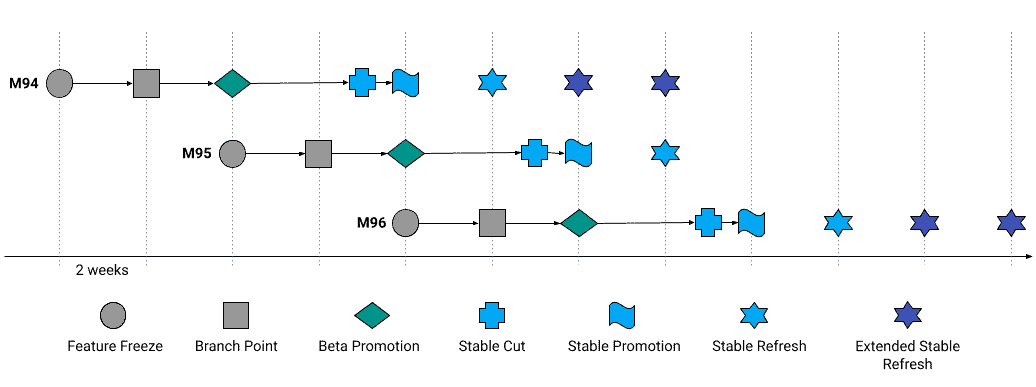Google announced yesterday that it plans to migrate from a 6-week release cycle for its Chrome web browser and Chromium to a 4-week release cycle.
The company releases a lot of browser versions in the six week period, mostly beta and development versions of Chrome. Chrome Stable has a fixed release cycle of 6 weeks and will see its version bumped after the release period.
Starting in the third-quarter of 2021, that release cycle is reduced by two weeks. Google notes that it has optimized its release processes and testing in the past, and that the improvements paved the way for pushing out new Chrome Stable versions more quickly to users.
To address Enterprise needs, Google will release a new browser version called Extended Stable. Chrome Extended Stable will have a 8-week release cycle and get security update patches every 2-weeks. The browser version won't receive feature updates or even some of the security updates in the time according to the announcement.
Security updates on Extended Stable will be released every two weeks to fix important issues, but those updates won’t contain new features or all security fixes that the 4 week option will receive.
Chrome Stable and Chrome Extended Stable share the same features and patch levels in the first four weeks after a new release cycle begins. The two browser versions divert from each other in the four weeks that follow, as Chrome Stable will be bumped to a new version and receive new features as part of the process, while Chrome Extended Stable will stay on the previous version without these feature updates. The two browser versions are unified again after the 8-week release cycle ends.

What about other Chromium-based browsers?
Many third-party browsers are based on Chromium, including Vivaldi, Opera, Brave or Microsoft's Edge web browser. The browser makers are impacted by Google's decision to speed up the release cycle and have two main options at this point:
- Follow Google's example and speed up the delivery of updates as well to a 4-week release cycle.
- Switch to the Stable Extended release cycle and delay releases by 2-weeks.
Not all browser makers follow Google Chrome releases closely, but releases are tied to Chromium's development nevertheless. Another possibility could be to implement security patches as they become available, but divert from Google's release cycle otherwise.
We contacted several browser makers and will update the article once we get replies.
Closing Words
Google follows Mozilla in speeding up the release cycle of the company's web browser. Both browser makers have switched to a 4-week release cycle by the end of the year. Mozilla switched already, Google will have made the switch in the third-quarter of 2021.
Now You: Do you care how often your favorite browser is updated?
Thank you for being a Ghacks reader. The post Google decides to switch to a 4-week release cycle for Chrome appeared first on gHacks Technology News.
0 Commentaires